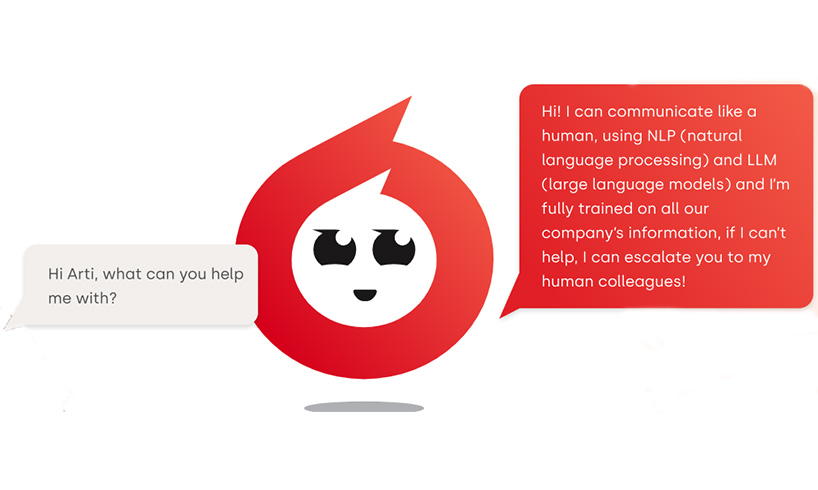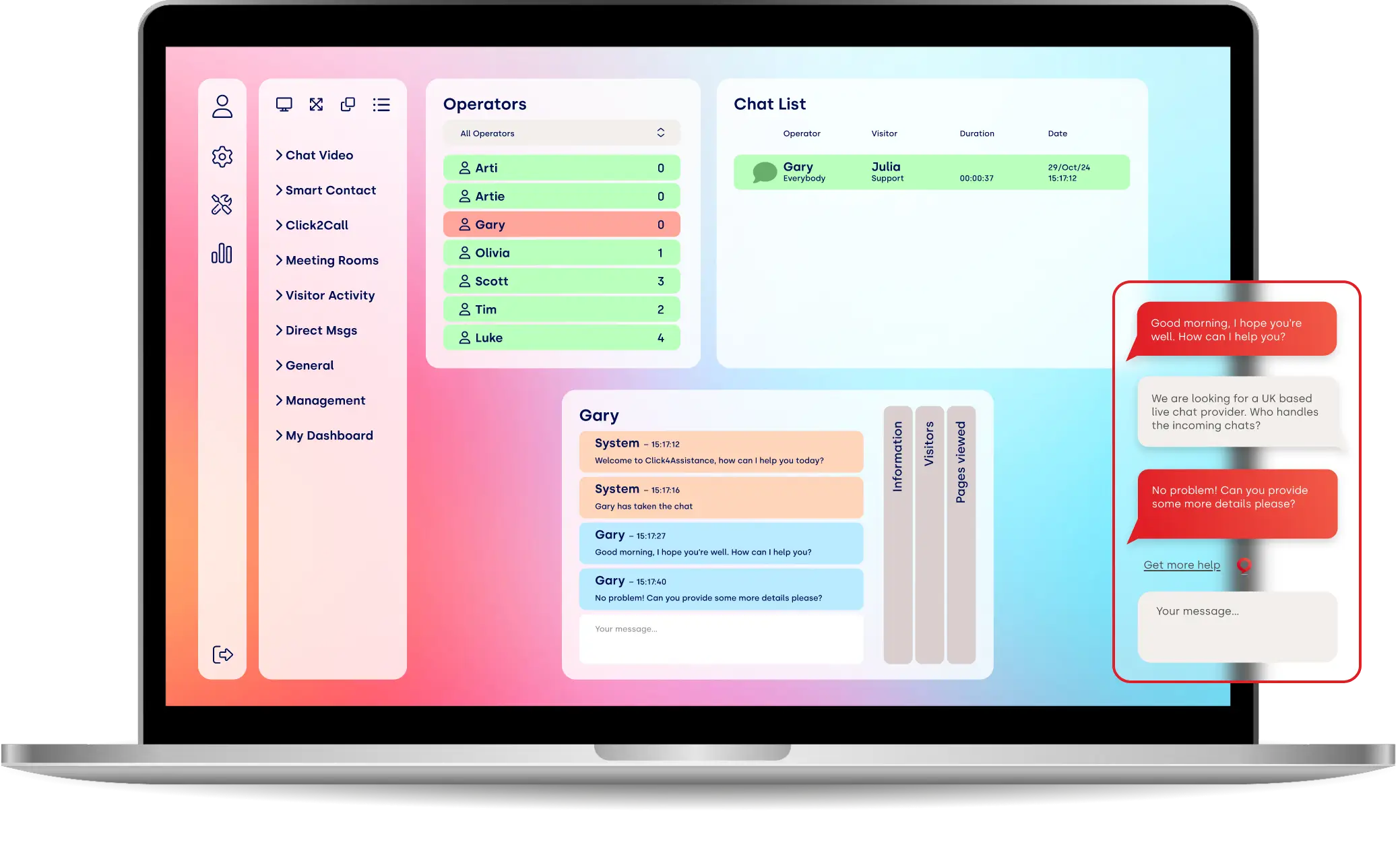How Chatbots For Logistics Can Transform The Supply Chain Industry

Discover how logistics chatbots are changing how the supply chain works, with in-depth details on their benefits, applications, and skills (including real-world examples).
Logistics supply chains are complicated to manage. Things often can go south easily because of the sheer number of moving parts.
However, chatbots offer an interesting and unexpected solution. AI-powered intelligent communication software can improve operations and eliminate some downsides of managing external parties.
The purpose of this post is to explain the role of chatbots and AI in the logistics segment. We look at the benefits of integrating chatbots into website home pages and the various skills they offer. Once you finish reading this article, you will be in a better position to manage your logistics with the latest technology.
The Logistics Market
Given the advances in AI and natural language processing technology, the value of the AI chatbot industry is exploding. Companies want to use the tool to improve services and support consumers throughout the sales pipeline and conversion process.
The global chatbot market will grow at 22.9% annually between 2024 and 2036, according to projections by Research Nester. Total revenue for the industry will rise from £4.69 billion today to £67.71 billion by the end of the study period – a more than ten-fold increase.
Google searches for “chatbot” are also rising, with over 490,000 in the past month.
The logistics industry is particularly interested in using chatbots because of the unique challenges it faces, including employee burnout. It believes the technology can reduce turnover by lowering how many repetitive tasks workers perform.
Importantly, chatbots don’t expend emotional energy when triaging customers and deciding who needs to escalate to a human representative. Unlike people, algorithms work based on inputs and rules, eliminating the risk of overload and unpleasant interactions with disagreeable clients.
Chatbots also decrease the need for reps to perform the same tasks repeatedly. Employees are less likely to feel bored, cynical, or exhausted as their work becomes more varied.
Chatbots could even improve critical customer service metrics. For example, Spiceworks found that 28% of firms saw improvements in average time to answer calls and customer satisfaction among companies using AI-based communication tools.
Seventy-six per cent of contact centres leverage chatbots to support operations and customers already. A further 50% say they improve hand-off to a human representative while 44% say it helps them deflect calls and reduce workload.
Benefits of having a chatbot on your website:
The benefits of chatbots on logistics firm websites are substantial. Companies implementing them can increase efficiency, improve customer satisfaction, establish superior reliability, and more.
Increased Efficiency
The main benefit of chatbots on websites is the increased efficiency they offer. AI-based systems are available 24 hours, allowing them to answer queries at any time of day. Customers can get replies immediately without waiting until office hours (usually the following day).
Chatbots can also automate the most repetitive and lowest value-added tasks, like answering frequently asked questions. This feature lets human reps use their skills elsewhere on more complex enquiries requiring freer thinking and decision-making.
Furthermore, because this process reduces the number of repetitive callers, it increases agent productivity and reduces burnout risk. Reps have more time to focus on the tickets that matter.
Delivery firm DHL already uses chatbots to answer customer queries about shipping and tracking. Clients can use the software for the latest information about their parcels, location, and estimated arrival time.
Furthermore, DHL’s in-house research into chatbots teases out nuances missed by most mainstream commentators. Through this, it discovered the best chatbots had a response rate of 90% among customers, compared to 40% for the average bot. It also found that supply chain companies increased average sales by 67% after chatbot implementation, with 57% reporting impressive return on investment (ROI) with minimal capital risk.
XPO Logistics also benefits from chatbot efficiency but takes a different approach. Instead of using chatbots to build customer relationships, it leverages them for internal communication, making dull and repetitive tasks more streamlined for employees.
For example, warehouse staff can use chatbots to count inventory levels or query picking instructions. Cycle counting for audits helps with shrinkage monitoring and identifying other anomalies without manual work.
Improved Customer Satisfaction
Implementing chatbots in logistics firms also boosts customer satisfaction. Clients feel encouraged you are taking their feedback and questions seriously.
For example, chatbots can boost response speed. Instead of waiting for a rep to type or speak an answer, bots can generate them immediately.
Furthermore, chatbots can provide answers that fit the brand’s desired voice. AI language models can digest corporate brand outlines and use these as inputs in their responses, allowing them to perform as better representatives.
There’s also the benefit that arises from chatbots offering first-point-of-contact resolution. Clients don’t bounce from one agent to another but get help with their problems now.
These speed-related efficiencies reduce payments supply chain firms must pay due to storage. The ability to receive information rapidly improves decision-making and reduces risks substantially.
Better Reliability
Lastly, chatbots can help improve reliability in the logistics and supply chain. AI-based models can provide consistent information to clients, equipping them with the best available information given their situation, complaints or queries.
For example, UPS uses chatbots to help customers with package tracking and delivery. The tool integrates with various social media platforms, enhancing the customer experience and making tracking more transparent. The scheme is so successful, it allows the parcel delivery firm to save $200 million a year.
Skills of an AI as a chatbot:

Most supply chain company directors aren’t aware of the skills of AI chatbots or how much money they could save by using them. But as the UPS example makes clear, those savings can be substantial.
Some surveys put the potential savings at 30% of the total tasks performed by customer service representatives, saving $23 billion in the US (£18.4 billion). However, this likely underestimates the true scale of savings because chatbot functionality goes beyond call centre staff.
Below, we list some additional examples of what AI chatbots can do in logistics. While customer service is one of their roles, these solutions offer more holistic support for supply chain enterprises.
Site navigation
For example, bots can help supply chain firms navigate logistics website pages. Tools can provide information on where to find resources, articles, tracking tools, and contact information.
This functionality is possible because chatbots understand natural language. Systems can read site pages and use data gleaned to direct users to the proper destination, even if they use non-standard language or change their minds halfway through a query.
Click4Assistance’s live chat software adds to this by letting human reps direct users via chatbots. Our smartCast tool enables them to provide in-chat directions to specific articles, information, or educational resources.
Submitting feedback and customised forms
Logistics companies can also use AI chatbots to help clients submit feedback and customised forms. This capacity saves time and frees staff to work on the most valuable tickets.
For example, chatbots can start conversations with clients to gather feedback on their experience. AI can pose questions as multiple-choice or open-ended, depending on the insights you want to glean.
Once they collect data, systems can absorb collected information and analyse it. Examination can reveal where logistics firms are doing well, and where they require improvement.
Chatbots also serve as useful guides for directing users through complex form-filling procedures, such as customs declaration documentation, dangerous goods, export control and incoterms forms, and phytosanitary certificates. Bots can answer questions about what to do at a specific step or provide guidance for every field in sequence and sometimes pre-fill forms with relevant information, saving time and reducing errors.
Enables the company to streamline repetitive tasks and enquiries
Another clear benefit of chatbots is their capacity to help logistics firms streamline repetitive tasks and enquiries. Companies can use them to reduce rote tasks, improving staff morale.
For example, chatbots can provide answers to the most common questions regarding:
- The location of a shipment
- The estimated time of delivery for the shipment
- Information regarding shipment delays
- Information regarding picking up a shipment
- Information concerning discounts for high-volume shipments
- Shipment tracking numbers
- Cold chain logistics information
- International shipping requirements and documentation
- Shipping re-scheduling options
- Customer service contact details (phone and email)
- Customer service operating hours
- Specialised services for valuable or delicate items
- Shipping options based on products and shipment size
Assistance in warehouse management
There’s also a case for chatbots to help manage logistics company warehouses. AI can provide detailed information to managers when prompted in natural language.
For example, staff can query chatbots regarding inventory levels (as long as stock-monitoring systems integrate with chatbot functionality). AI systems ensure they have the proper levels of products in stock, based on expected demand.
Chatbots can also help locate products – ideal for businesses relying on manual picking and packing. Solutions can direct staff to the proper location via the shortest route, making order collection more efficient, reducing wage bills and boosting dispatch times.
Even troubleshooting assistance may help in some settings. AI chatbots could integrate with demand forecasting solutions, helping staff order products in suitable quantities and time frames. Over time, training reinforcement will make bots more capable, allowing them to get closer to the truth.
Monitor shipments
Logistics firms can use AI chatbots to monitor shipments as they make their way through the supply chain to the end user. For example, firms can integrate chatbots with tracking systems, as brands like UPS and DHL have. Customers and supply chain firms can get up-to-date in-transit information about their packages as they pass through various checkpoints, including warehouses, customs, and distribution locations.
Connecting chatbots to SMS or email accounts lets them provide users with proactive updates. These are even more beneficial, keeping customers and clients in the loop without requiring them to expend energy interacting with chatbots in the first place. Information arrives, like clockwork, providing them with the information they require for peace of mind.
Visitor Monitoring
Logistics companies can also use chatbots for website visitor monitoring. Firms can use the collected data to gauge interest in their services and help clients move past paint points.
For example, suppose a chatbot tracks prospects and clients as they navigate a website. Keeping tabs on their movements lets logistics companies see their pain points – areas of their sites they find difficult to navigate. Chatbots can remedy this problem by showing users where to go next to meet their objectives.
Chatbots can also reveal what aspects of a site interest users the most. The data they collect can expose the landing pages, content, images, videos or services they love most.
Sometimes, brands use chatbots for lead identification. Following users and asking them questions can determine if they might be buyers of your products. More sophisticated analysis of their movements also provides an opportunity to provide them with personalised offers, such as “20% off” if they buy today.
Stored customer conversations
Stored customer conversations are another benefit of sophisticated chatbots (like the ones available at Click4Assistance). These let you rifle through your existing dialogue and get up to speed immediately with the issue instead of asking customers to repeat information.
Using stored customer conversations is essential given customers’ rising expectations. Data suggest that 39% of clients won’t spend money at a business if it doesn’t provide a personalised service. Therefore, keeping tabs on where they are in the sales pipeline and the issues raised previously can help customise responses and reduce the risk of frustration.
Bot-to-human transfer
In addition, chatbots function as logistics firms’ intelligent virtual assistants (IVAs). Firms can use them to escalate calls when necessary, weeding out time-wasters and issues bots can answer.
Owing to large language models (LLMs) and natural language processing, chatbots are better at identifying situations beyond their capabilities. The software can detect highly technical or complex queries, forwarding them to specialists when necessary.
Furthermore, chatbots can use the stored customer conversations discussed in the previous section. Reps can get up to speed immediately with the clients’ supply chain issues, enabling faster resolution.
Proactive Problem Solving with predictive analytics
Proactive problem-solving is another impressive AI chatbot skill coming to fruition. Advanced software can absorb complex information and spit out helpful responses based on user inputs.
Predictive analytics takes this capability a step further. Instead of reacting to client inquiries, chatbots can probe what else users might need before they ask, such as additional services or more frequent tracking updates. These techniques require access to various data sources, including historical customer interactions, weather forecasts, and consumer sentiment. Pulling these data sources together and compiling an outlook can make forecasting more accurate.
The benefits of logistics service users from these technologies are immense. Solving problems proactively can foster greater loyalty and prevent significant errors that might set clients back financially.
Proactive customer support
Proactive customer support works on a similar principle. Here, chatbots look into the future and try to predict what customers might want. For example, it might:
- Make personalised recommendations on logistics services to use next
- Provide shipping status updates
- Offer additional packaging materials for delicate or valuable items
Enhanced intelligence through advanced algorithms
Deep learning chatbot algorithms can also enhance logistics firms’ business intelligence. Bots can collect data and feed it into models to discover hidden patterns conventional statistics wouldn’t detect.
In some cases, these insights may also help with predictive forecasting. Companies might be able to see which variables appear to “Granger cause” changes in demand, shipping durations, or other metrics of concern. Feeding these into the appropriate model could potentially enhance outcomes for customers.
Live chat: Humanised interactions with emotional intelligence
Adding live chat could also enhance logistics firms’ chatbot interactions. Humans offer emotional intelligence and understanding, beating out the best AI systems.
At Click4Assistance, we believe in combining bots with human reps – the ultimate one-two combination. Chatbots reduce costs and improve efficiency, while people improve customer relationships, and rapport, providing emotional validation.
Omnipresence across Multichannel Platforms
Finally, AI chatbots can be present across multichannel platforms, giving logistics brands even more avenues to support their clients. Already firms are integrating chatbots into social media platforms, such as Facebook and WhatsApp, with plans to expand this to home assistants, like Google Assistant and Amazon Alexa.
This approach lets customers interact with your firm through their channel of choice. Switching platforms becomes unnecessary, encouraging more communication and reducing the risk of customers becoming angry.
Conclusion
Data suggest that chatbots save businesses £15.5 billion ($20 billion) globally – a massive figure by any standards. As such, logistics firms should use the technology where possible Sophisticated chatbots can answer customer enquiries 24 hours, reduce wait times, provide faster responses, improve website navigation, eliminate repetitive tasks, and integrate with social media platforms for a superior customer experience. Even ordinary chatbots can help employees be more efficient by providing immediate answers to their questions.
Click4Assistance offers natural language chatbot solutions for logistics firms integrated with live chat applications. These improve efficiency and productivity while boosting client trust and loyalty.

























